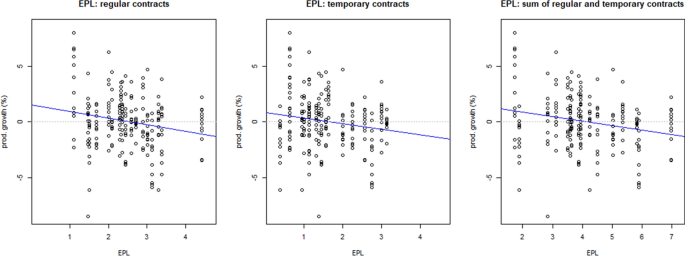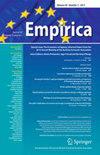Employment protection and labour productivity growth in the EU: skill-specific effects during and after the Great Recession
IF 1.8
4区 经济学
Q2 ECONOMICS
引用次数: 1
Abstract
Abstract Does employment protection affect sectoral productivity growth differently during crises and recovery periods? This paper sheds light into this question by investigating the relationship between employment protection legislation (EPL hereafter) and sectoral labour productivity growth in the EU in the context of the Great Recession. We consider the crisis and recovery periods, evaluate the relevance of both levels and changes in EPL for productivity growth, and explore the conditioning role played by sectoral differences in terms of cumulativeness of knowledge as well as the skills of the labour force, captured by different levels of education. We find that stricter labour protection reduces labour productivity growth in sectors with a large share of workers with tertiary education, whereas this effect is negligible or positive in sectors where workers with secondary or only primary education are more prevalent (such as agriculture, mining and quarrying). We attribute this to a more intensive labour hoarding in the former, as EPL strengthens labour hoarding in sectors that rely on firm-specific knowledge accumulation and skilled human capital that are difficult to substitute with physical capital. Whereas it is simple to dismiss (and to find later) unskilled employees. They not only can be substituted more easily with capital, but also the costs of their firing are lower, they are overrepresented among workers holding temporary contracts, and they might be unequally informed and able to exercise their rights. This leads to low (if any) labour hoarding and little impact of EPL on labour productivity in such sectors. We also document that the negative effect is prominent only during the crisis, and an increase in the stringency of EPL over an extended period stimulates employers to substitute labour with investments in physical and knowledge capital.

欧盟的就业保护和劳动生产率增长:大衰退期间和之后对特定技能的影响
在危机和复苏时期,就业保护对部门生产率增长的影响是否不同?本文通过调查大衰退背景下欧盟就业保护立法(EPL)与部门劳动生产率增长之间的关系,揭示了这一问题。我们考虑了危机和恢复期,评估了EPL水平和变化与生产率增长的相关性,并探讨了不同教育水平下知识积累和劳动力技能方面的部门差异所起的调节作用。我们发现,在拥有大量受过高等教育的工人的部门,更严格的劳动保护降低了劳动生产率的增长,而在工人受过中等教育或仅受过初等教育的部门(如农业、采矿和采石),这种影响可以忽略不计,甚至是积极的。我们将此归因于前者更密集的劳动力囤积,因为EPL加强了依赖企业特定知识积累和熟练人力资本的部门的劳动力囤积,而这些部门难以用实物资本替代。然而,解雇(然后再找到)不熟练的员工很容易。他们不仅可以更容易地被资本取代,而且解雇他们的成本也更低,在持有临时合同的工人中,他们的比例过高,而且他们可能不平等地了解情况并能够行使自己的权利。这导致低(如果有的话)劳动力囤积和EPL对这些部门的劳动生产率的影响很小。我们还记录了负面影响仅在危机期间突出,并且在较长时期内增加EPL的严格程度会刺激雇主用物质和知识资本的投资来替代劳动力。
本文章由计算机程序翻译,如有差异,请以英文原文为准。
求助全文
约1分钟内获得全文
求助全文
来源期刊

Empirica
ECONOMICS-
CiteScore
2.70
自引率
7.70%
发文量
24
期刊介绍:
Empirica is a peer-reviewed journal, which publishes original research of general interest to an international audience. Authors are invited to submit empirical papers in all areas of economics with a particular focus on European economies. Per January 2021, the editors also solicit descriptive papers on current or unexplored topics.
Founded in 1974, Empirica is the official journal of the Nationalökonomische Gesellschaft (Austrian Economic Association) and is published in cooperation with Austrian Institute of Economic Research (WIFO). The journal aims at a wide international audience and invites submissions from economists around the world.
Officially cited as: Empirica
 求助内容:
求助内容: 应助结果提醒方式:
应助结果提醒方式:


